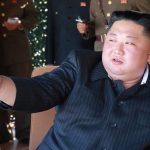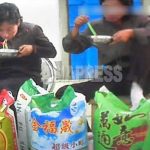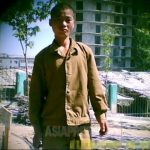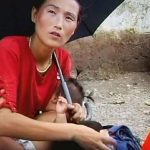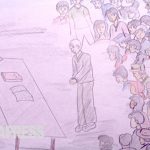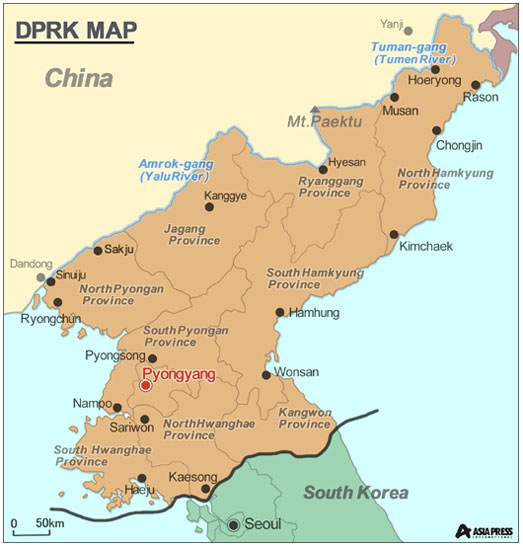
◆ The government’s intensifying controls deliver a death blow
In addition, the three controls strongly promoted by the Kim Jong-un administration are adding to the challenge faced by food-insecure households.
The first measure implemented by the government has been to thoroughly prevent grains from leaving farming areas. Starting in the past, the government - wary of losing food that should be given to the state – has been preventing grains from leaving farm areas by setting up checkpoints on roads heading from farm areas to cities until officials collect the quotas of crops for the military and the state.
This checkpoint system is now in place all the time, meaning that armed guards are stationed around the farm warehouses to monitor theft and the siphoning off of grains. As a result, farmers can no longer sell their own cache of grains to merchants in urban areas while urban sellers are no longer able to come and buy grain in rural areas. In short, farmers have lost their way to earn cash.
Secondly, the government has prohibited the cultivation of hill and mountain slopes and other non-agricultural land, collectively known as “sotoji.” The Kim Jong-un administration is cracking down on farmers' cultivation of mountain slopes in the name of forest protection. Those who violate this rule are subject to having their crops taken away without mercy.
The third measure implemented by the government is the prohibition on "selling on credit." Many rich people in urban areas and farm managers had been lending grain, cash, and daily necessities at high interest rates to farmers who couldn't eat during the "barley hump” period on the condition that the farmers would pay the lenders back after the fall harvest. In North Korean parlance, money or goods lent out this way are called “tegeori” or “yijadon.”
This business is terrible because it takes advantage of poor farmers; however, but for hungry farmers, the lending makes it possible for them to overcome hunger for the time being. Starting two years ago, “selling on credit” has been a focus of government crackdowns as a “non-socialist act.” The authorities say that such bad behavior was created by the “exploiter class” in the past.
"They have taken the forceful approach of writing-off past debt, , so no one 'sells on credit' to hungry farmers anymore," says the collaborator.
◆ Prospects for North Korea’s future grain production
Farm A, having exhausted all possible ways to improve the situation, finally sent a petition to the central government in April asking for food supplies from the state. However, the government has taken absolutely no measures to supply food as of mid-April.
The collaborator who provided the information for this article concluded his report as follows:
"Currently, Farm A still possesses about 20% of the harvested grain that must be handed over to the state. Farmers are hoping that the state will return the grain to the poor.
Farmers themselves are starving, and agricultural machinery such as tractors, fertilizers, fuel are prioritized for the country’s grainbasket of (North and South ) Hwanghae provinces. As a result, many areas of the country will face difficulties in agricultural production this year.”
* ASIAPRESS sends Chinese phones into North Korea to stay in touch with its collaborators.
- <Inside N. Korea> Kim Jong-un expresses rage over continued leaking of secret documents, handing down order to prohibit party organizations from printing documents (2022-04-25 )
- <Inside N. Korea> Outer walls of the special tourism zone pushed by Kim Jong-un have collapsed and cracks are occurring one after another. (2022-04-19
- <Inside N. Korea> Escape From Samjiyon: Young People Flee Kim Jong-un's Luxury Tourism Zone. "There are no Chinese tourists because of coronavirus. We can't survive." (2022-03-31)
- <Inside N. Korea> State of Emergency Ordered Following Coronavirus Outbreak in China…Night Curfew and Strict Quarantine Measures Reinstated and Construction at the Border Brought to a Halt (2022-03-22
- <Inside N. Korea> Regime Maintains 8 Year Enlistment Policy but Shifts Focus to Training University Graduates for “Scientific Warfare” (2022-03-17
